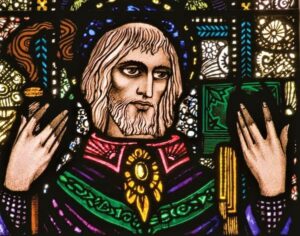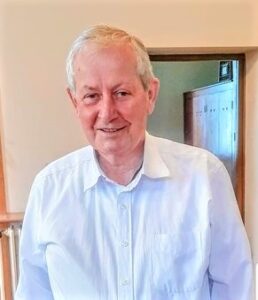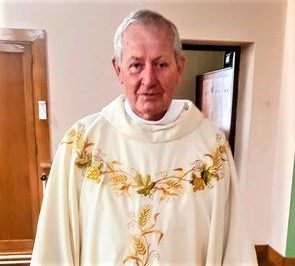Columban comes across to us as a complex character: humble and haughty; harsh and tender; a warrior and a dove; a stickler for the Rule, yet impetuous; a commanding character; a Prophet more than a Priest, Fr Liam Carey told the community in Dalgan on 23rd November.
“Do this in memory of me”. We give thanks for the many who sowed the seeds of that memory in our hearts, especially our parents, family and community – and for the spirit here in Dalgan that welcomed and nourished us on the road.
We remember the peoples to whom we were sent: they awakened us anew to that memory. I had the privilege of being sent to Latin America at a time of great upheaval. A time when thirty million people were migrating internally within the continent, uprooted from their rural habitat, exiled to the sprawling favelas of the cities.
This People of God were led with new vigour by a Church that was finding its own voice after Vatican Two; with leaders like Dom Helder Camara, Dom Fragoso, Dom Jose Hanrahan, Dom Paulo Arns, Dom Lucas Mendez, Paulo Freire, Chico Mendez, our own Sr Joan Sawyer, Sr Dorothy Stang, the Little Sisters of Charles de Foucauld and many more holy men and women.
Their work, their mission generated great hope that inspired commitment to serve, especially where life was denied. No doubt all of you have great memories of lived experience in your lands of mission.
Today we gather to celebrate the memory of our own patron, St Columban who 1400 years ago led a renewal of continental proportions. He arrived in a Europe devastated by Barbarian invasions; a Church in decay, plagued by simony; a kingdom torn apart by bloody feuds and family murders. Into this cauldron comes Columban with his twelve companions. By now he is 45 or so, a formed monk in the most austere and demanding monastery of the Celtic tradition, at Bangor and under Comgall. Previously he had spent time in Cleenish under Sinnell where he received an intellectual and spiritual formation along the lines of Clonard, where Biblical Studies were prioritized. Already as a youth he had shown strength of character: having been counselled by a holy woman to opt for the “noblest of calls”, he leaves his broken-hearted mother in the doorway, as he opts for exile on far-away Cleenish, never to return.
After some time, he is received at Bangor where he is called to serve as Monk and Priest. Held in high esteem, he is entrusted with high responsibility, especially in teaching and formation. After some twenty years with Comgall, his Celtic spiritual temperament awakens anew to wander for Christ. Like Drake, he hears a voice, “Disturb us Lord to dare more boldly; to venture on wider seas where storms will show your mastery; where losing sight of land we shall find the stars…; push back the horizons of our hopes, and let us meet the future with strength, courage and hope”. Comgall reluctant to let this treasured member of the community go, eventually honours his deep desire and thirst for further exile. Taking with him twelve companions into a small boat, with little more than pure trust that the winds of the Spirit would sail them to that place in the deep to cast out their nets.

St Columban
This pilgrim for Christ having sailed the Irish Sea crossed the Channel and marched the breadth of the Franking Kingdom. Impressing authorities with his reflections, he is invited to set up a monastery at Annegray in the Vosges mountains by King Childebert. There followed in quick succession Luxeuil and Fontaine. These new foundations were such a breath of fresh air they attracted great numbers and their influence spread far and wide. Nobles entrusted their sons’ formation to them. The poor, the lame, the sick were drawn to him; even criminals knelt alongside him as he prayed. A gentle warmth of understanding combined with a fervent faith caused him to be credited with healing powers.
Columban comes across to us as a complex character: humble and haughty; harsh and tender; a warrior and a dove; a stickler for the Rule, yet impetuous; a commanding character; a Prophet more than a Priest. No institutions appointed him. He arrived like John the Baptist and the people go out to the wilderness to meet him, abandoning the French cathedrals in search of authenticity.
They find a monk of outstanding freedom and independence of mind, one who will ignite many quarrels throughout his life. Teaching humility, he found himself obliged to correct both Popes and Kings with spiritual courage and devotion to principle. His determination made him the great leader of his time. His life is a life of transformation in God’s love – through solitude, harsh discipline and self-sacrifice – as he ascended the road to sainthood.
“I left my native land for love of Christ. I shall not leave this place unless I am forced…”. Politically very astute, he is aware that a combination of forces have united to expel him: namely, the French Bishops, the aristocracy and the wayward King, and the Queen Mother. Columban himself recounts with a touch of resentment, “That dog Theodoric dragged me from my beloved brothers…”; like Peter, whose chair he admires and defends, he is dragged to where he would rather not go.

Fr Liam Carey SSC
As the ship with the few remaining Irish monks sails out, the winds of the Spirit force her back to port. Reading the signs as God’s hand calling for further exile, Columban, crossing the Frankish Kingdom and avoiding the territory of King Theodoric, finds himself on the Rhine. At the helm again, his lungs filled with vigour and spirit, he rhymes out encouragement to his remnant against the current: “For clouds and squalls will soon pass on and victory with work well done – Heave lads and let the echo ring. So, Satan acts to tire the brain and by temptation souls are slain – think lads of Christ and echo him”.
On the shores of Lake Constance at Bregenz a new foundation is begun among Germanic peoples. After two years in the midst of political upheaval he discerns to do battle with the Alps. There before the mountains occurs what must have been the most heart-rending episode for both Columban and Gall, friends who shared a life, to be reconciled only on Columban’s deathbed. What divided them? Was if obedience? Was it love of the Germanic peoples?
Columban now in the Winter of his life, with determination and missionary zeal burning in his heart, drives on and over the Alps where he meets the Lombards and King Agiluff who welcomes him. At Bobbio he will find the solitude and rest he so desired. And yet, pastoral zeal and missionary spirit disturb his conscience calling him now to rectify the damaging and scandalizing consequences of Pope Virgilius’ decisions on the Arian heresy. His letter to Pope Boniface IV encourages the latter to set an example for all and let the Chair of Peter guide conscience to truth.
Yahweh bares his holy arm in St Columban so that the ends of the earth shall see God’s salvation. A man of unmatched energy and vigour, almost inhuman in his severity to himself and others. Yet his authority and tenderness continue to inspire men and women, like Ned Galvin and Francis Moloney and their future followers to hear the cries from under the cross on the frontiers of today’s world – cries of Migrants, of Nature, of Peace and Dialogue.

